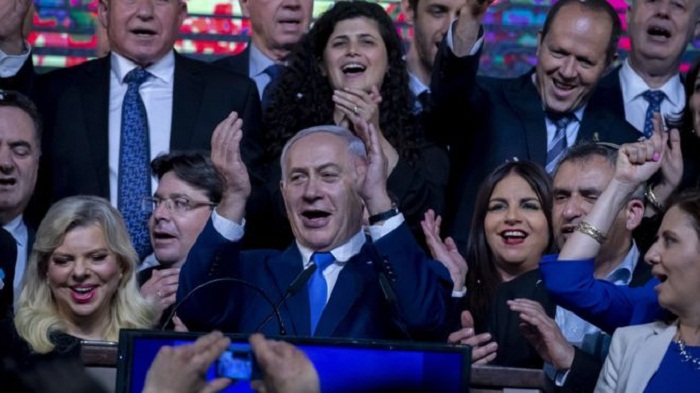PM Benjamin Netanyahu is likely to secure a record fifth term after almost complete results from Israel’s election suggest a new right-wing coalition.
His Likud party is expected to finish with a similar number of seats as ex-military chief Benny Gantz’s centrist Blue and White alliance.
But Likud and right-wing allies are set to be the largest bloc with 65 seats in the 120-seat Knesset, local media said.
The 69-year-old premier is facing corruption allegations.
However, the election result means he could become Israel’s longest-serving prime minister later this year, overtaking Israel’s founding father David Ben-Gurion.
Exit polls had predicted a tight race with no clear winner, prompting both Mr Netanyahu and Blue and White leader Benny Gantz to claim victory on Tuesday night.
“It will be a right-wing government, but I will be prime minister for all,” Mr Netanyahu told cheering supporters.
“I’m very touched that the people of Israel gave me their vote of confidence for the fifth time, and an even bigger vote of confidence than previous elections.
“I intend to be the prime minister of all citizens of Israel. Right, left, Jews, non-Jews. All of Israel’s citizens.”
No party has ever won a majority in Israel’s 120-seat parliament and it has always had coalition governments.
Challenges for Netanyahu:
There were roars of celebration at the election night party for Benny Gantz as the first exit poll was released. His supporters believed Israel was on the brink of a new centre-ground government.
But as the votes were counted overnight, Benjamin Netanyahu’s success became clearer. The incumbent PM’s Likud party appears most likely to be able to form another coalition government with the help of right-wing nationalist and religious parties.
He said history had given the people of Israel another chance as his supporters, using his nickname, chanted: “Bibi, the King of Israel.”
With left-wing and Arab-Israeli parties suffering heavy losses, his win appears decisive, despite the most serious challenge yet to his decade in office.
What was the elections strategy of Netanyahu:
Mr Netanyahu, 69, put forward tough messages on security ahead of the vote and it soon became one of the election’s key issues.
He also made a significant announcement in the final days of the campaign, suggesting a new government would annex Jewish settlements in the occupied West Bank.
The settlements are considered illegal under international law, although Israel disputes this.
In a separate controversy on Tuesday, Israeli Arab politicians condemned his Likud party for sending 1,200 observers equipped with hidden body cameras to polling stations in Arab communities.
The Arab alliance, Hadash-Taal, said it was an “illegal” action that sought to intimidate Arabs. Likud said it wanted to ensure only “valid votes” were cast.
Mr Netanyahu’s main challenger, Mr Gantz, is a retired lieutenant-general who formed the Blue and White in February, promising to unite a country that had “lost its way”.
The 59-year-old former chief of staff of the Israeli military rivalled Mr Netanyahu’s tough stance on security and promised cleaner politics.
Mr Gantz’s campaign platform referred to “separation” from the Palestinians but did not specifically mention them having an independent state. It also called for continued control over the Jordan Valley and retaining West Bank settlement blocs.
Corruption Charges against Netanyahu:
At the end of February, Attorney General Avichai Mandelblit informed Mr Netanyahu that he intended to indict him on charges of bribery, fraud and breach of trust in connection with three cases, pending a final hearing.
Now that the election is over, the evidence in those cases is to be turned over to the lawyers of the various parties involved.
The prime minister is alleged to have accepted gifts from wealthy businessmen and dispensed favours to try to get more positive press coverage. Mr Netanyahu has denied any wrongdoing and says he is a victim of a political “witch-hunt”.
A date for the final hearing, at which the prime minister and his lawyers would be able to argue against the allegations, has not yet been set. Mr Mandelblit has said the Supreme Court will determine whether Mr Netanyahu has to resign if he is charged.
There have been reports that Mr Netanyahu will attempt to persuade his potential coalition partners to pass legislation that would grant prime ministers immunity from prosecution while in office.
The Jerusalem Post reports that Likud and four other allied parties, who together will control 61 seats in the Knesset, have made it clear that they will not require Mr Netanyahu to resign if he is charged.
Gaza issue?
Recent weeks have seen tensions flare between Israel and Palestinian militants in the Gaza Strip, and US President Donald Trump is expected to publish his plan which aims to solve Israel’s long-standing conflict with the Palestinians soon.
However, ways to revive the moribund peace process were not a main subject of electoral debate. Many Israelis appear to see little hope in the longstanding international formula for peace – the “two-state solution”.
In the final days of the election campaign, Mr Netanyahu made a significant announcement suggesting a new government led by him would annex Jewish settlements in the occupied West Bank. The settlements are considered illegal under international law, although Israel disputes this.
Israel’s once-dominant Labour party, which sealed a breakthrough peace deal with the Palestinians in the 1990s, managed to win just six seats – its worst-ever performance.
The secretary general of the Palestine Liberation Organisation (PLO), Saeb Erekat, tweeted a downbeat view of the prospects for peace.
A two-state solution is the shorthand for a final settlement that would see the creation of an independent state of Palestine within pre-1967 ceasefire lines in the West Bank, Gaza Strip and East Jerusalem, living peacefully alongside Israel.
